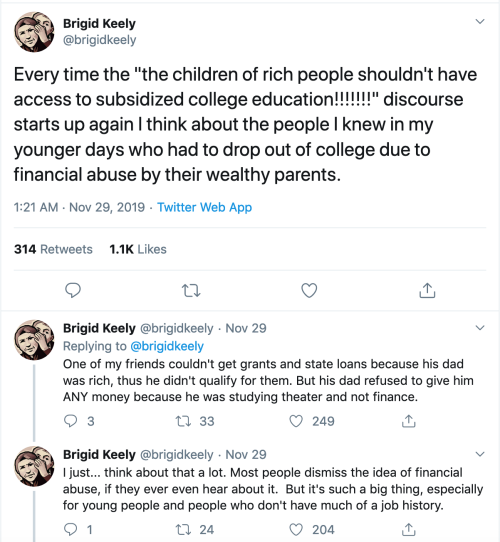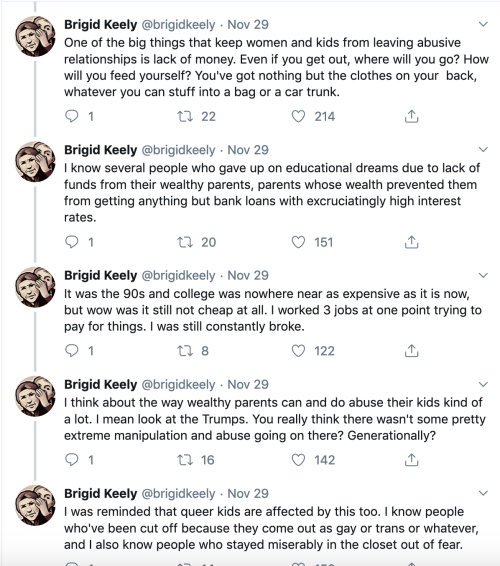megpie71: jenroses:nentuaby: givemeunicorns:death-burst:My usual retort to people who don’
megpie71: jenroses:nentuaby: givemeunicorns: death-burst: My usual retort to people who don’t want “universal healthcare/education/basic income/etc.” under the pretense that “the rich shouldn’t have access to it” is that it’s cheaper to just give it to everyone no-question-asked than to try and judge every single case just to exclude a tiny minority of them. But this tweet thread? This right there? That’s a damn powerful argument. Something that can actually convince people emotionally, more than my cynical, it’s-cheaper-that-way, pragmatic approach. I’ll keep it, and I’ll re-use it, because it’s with thread like this that you change the world, one opinion at a time. The number of people I know, myself included, who stayed in the closet because they feared the lose of financial support from their parent is crazy. My partner grew up poor. Her parents didn’t have shit. But they managed to financially abuse her in this exact manner just by refusing to provide documentation that they were poor. No parental income documentation? No FAFSA. No FAFSA? None of the need-based aid she was 100% qualified for. No aid? No college for her poor ass. So no, this “but what if a person who didn’t need the help got it” rhetoric will not just harm the children of the rich, even the marginalized and estranged children of the rich. It harms everyone whose parents don’t want them to succeed. I dropped out of the prestigious college I started at because I lost my financial aid when my parents got an unexpected one-time windfall and refused to give most of it to the school. I don’t blame them, really, but I struggled for another year to afford a state school, then got knocked up and dropped out and never really went back because school just kept getting more expensive. I know people who did not go until they were in their mid 20s because their parents just wouldn’t do the FAFSA and they couldn’t get aid without it. I went to the school I picked because of the financial aid I could get that first year. If I’d picked almost any other school, I would have qualified for a full ride, merit-based, because I was a national merit scholar coming out of high school with a 3.87 in mostly ap classes, scads of activities, etc. I sometimes think if I had to give advice to my younger self I’d tell them to start at the state school even if there were people from the home town there. I’d have met my husband 10 years earlier and finished my degree, maybe, you know? It’s probably worth noting one of the known side-effects of long-term, persistent poverty situations is a decline in executive function capacity. Or in other words, it may be that in a lot of these cases where people were “poor enough” to get financial assistance, but where their parents “didn’t bother”, “refused” or “wouldn’t do it” with regards to filling out the forms, what we were actually seeing in those parents was a group of people who looked at the forms (which no doubt require things like “putting down your full income for multiple years” or “listing all your assets at current market value”, looking up details of past tax filings and tax returns over a multi-year period, providing payslips as evidence, providing bank statements, and so on) and just went “I do not know where to even start with these, and there’s no way I can fill them out”. That isn’t malice. It’s the cognitive consequence of living for years pay-cheque to pay-cheque, with very little margin for error on anything, and no cognitive resources available for anything other than worrying about whether the money will stretch far enough this week, this fortnight, or this month. The malice, if there is any involved, is the impersonal malice of a system which first grinds people into poverty, then expects them to function at the same cognitive level as the most wealthy of the wealthy (who in all likelihood hand all the paperwork to their accountants and say “figure out how to get Bratleigh through college at minimum cost to me, would you?”). (I have a certain amount of sympathy. I’m autistic, which is a disorder which diminishes executive functioning capacity; my joke is my mental executive spends a lot of their time out on the golf course. I could get funding through the NDIS to help deal with the side effects of my disability… if I could just assemble the necessary executive function to be able to fill out all the paperwork, collate all the necessary evidence, submit an application, and argue it through the bureaucracy. For some strange reason - can’t think why - I have a bit of trouble with this. Bureaucracy is designed to be navigable by bureaucrats - as in, bureaucrats are the ones who design them, and thus they think it’s all pretty straightforward, because this is what they do for a living. The rest of us have to figure it out from first principles).Returning back to the main theme of the thread: one of the benefits of universal free tertiary education (which is something the baby boomers had in my country, although they’d pulled the ladder up behind them by the time I graduated high school) is it provides so many more options to so many more people - and it also costs less to administer than any stringently means-tested scheme for funding tertiary students. In the same way, a decent universal basic income will make a huge difference for the people at the bottom of the heap (enabling a lot of the mental calculus of poverty to be if not actually avoided, at least greatly diminished) even as it barely counts as a drop in the bucket to the wealthy. The 1% are more likely to notice a universal basic income as an increase in their taxes than an increase in their income - but then, they can afford it. [image description by @snapcracklepop-myjoints here:(from image to text generator, edited)Twitter thread from Brigid Keely, @ brigidkeelyEvery time the “the children of rich people shouldn’t have access to subsidized college education!!!!!!!” discourse starts up again I think about the people I knew in my younger days who had to drop out of college due to financial abuse by their wealthy parents.One of my friends couldn’t get grants and state loans because his dad was rich, thus he didn’t qualify for them. But his dad refused to give him ANY money because he was studying theater and not finance.I just… think about that a lot. Most people dismiss the idea of financial abuse, if they ever even hear about it. But it’s such a big thing, especially for young people and people who don’t have much of a job history.One of the big things that keep women and kids from leaving abusive relationships is lack of money. Even if you get out, where will you go? How will you feed yourself? You’ve got nothing but the clothes on your back, whatever you can stuff into a bag or a car trunk.I know several people who gave up on educational dreams due to lack of funds from their wealthy parents, parents whose wealth prevented them from getting anything but bank loans with excruciatingly high interest rates.It was the 90s and college was nowhere near as expensive as it is now, but wow was it still not cheap at all. I worked 3 jobs at one point trying to pay for things. I was still constantly broke.I think about the way wealthy parents can and do abuse their kids kind of a lot. I mean look at the Trumps. You really think there wasn’t some pretty extreme manipulation and abuse going on there? Generationally?I was reminded that queer kids are affected by this too. I know people who’ve been cut off because they come out as gay or trans or whatever, and I also know people who stayed miserably in the closet out of fear./end Image Description] -- source link
Tumblr Blog : daloy-politsey.tumblr.com
#higher education#education#poverty#executive dysfunction#financial abuse#image descriptions#image transcription

